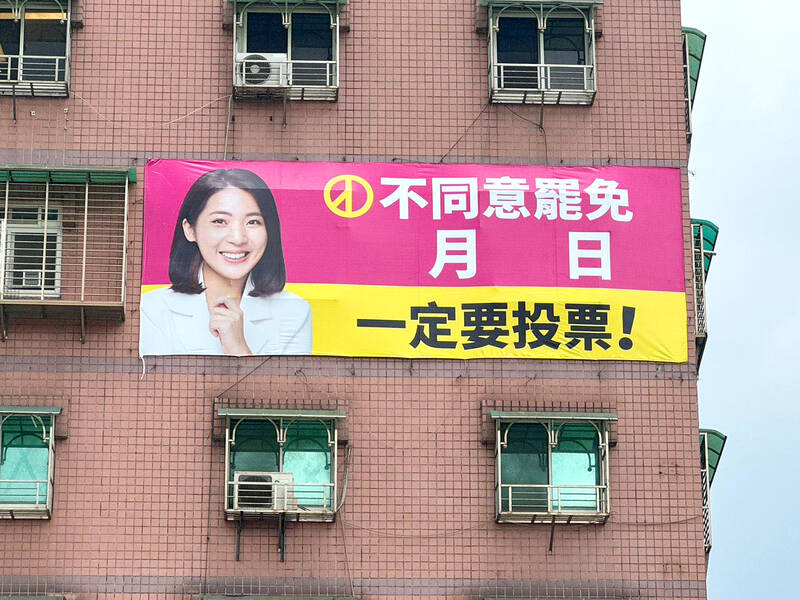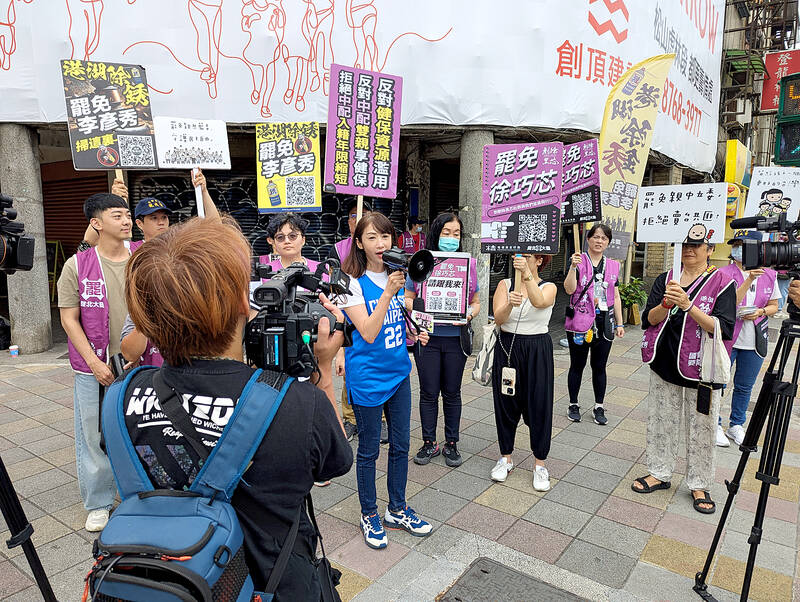There is no politician today more colorful than Chinese Nationalist Party (KMT) legislator Hsu Chiao-hsin (徐巧芯). The recall vote against her on July 26 will test the limits of her unique style, making it one of the most fascinating to watch.
Taiwan has a long history of larger-than-life, controversial and theatrical politicians.
As far back as 1988, lawmaker Chu Kao-cheng (朱高正) was the first to brawl and — legend has it — was the first to use the most foul Taiwanese Hokkien curse on the floor of the legislature. Current Democratic Progressive Party (DPP) lawmaker Wang Shih-chien (王世堅) has become famous for his wit, use of amusing theatrical props and the habit of losing bets, resulting in him having to jump into some body of water.

Photo: Tung Kuan-yi, Taipei Times
Hsu is unique in that she has mastered all of the above and more to keep herself in the spotlight.
She is outrageous and offensive, charismatic and cute, combative and contentious, flamboyant and theatrical, defiant and brash, funny and even at times whimsical.
She is adored, admired and respected by her largely deep blue supporters, and reviled, feared and detested by her largely pan-green detractors.

Photo: Lin Cheng-hung, Taipei Times
She is in the news almost daily and is a fixture on the top 10 politician list of DailyView’s “Internet temperature” tracker. She married the head of DailyView, but there is no reason to suspect nepotism; her media and online dominance is of her own making.
With a recall vote against her looming, the big question is will all her spectacle and controversy bring out her loyal fan base to flock to the polls to defend her? Or will her army of haters overwhelm them, recall her, and bring down the Hsu Chiao-hsin show?
RISING STAR
Only 35 years old, Hsu’s star has risen fast. She grew up in a modest home attached to her family’s breakfast shop in Taipei. Her parents were of classic KMT demographics, having fled the Chinese Civil War in and around 1949.
She was active in the KMT Youth League. With her articulate charm and seemingly fearless nature, she was picked as a spokesperson for Hung Hsiu-chu’s (洪秀柱) presidential run, and when Hung was dumped and replaced by Eric Chu (朱立倫), she was transferred to his campaign.
She later served as a spokesperson for both former president Ma Ying-jeou (馬英九) and former Taipei mayor Hau Lung-bin (郝龍斌).
She won a seat on the Taipei City Council in 2018, and her multi-pronged antics made her a favorite of Taiwan’s Taipei-centric media, vaulting her to national fame.
Hsu was the most visible of the “vigorous youth faction” (青壯派) of KMT politicians promoting “generational change” to challenge the old guard. This was extremely bold in the traditionally hierarchical party.
Despite only having just won her second term on the city council, she decided to launch a primary challenge to veteran politician Alex Fei (費鴻泰) to run for his south Songshan/Xinyi (南松山信義) legislative seat — one she claimed that Fei had promised her the seat (a claim that was news to Fei). When rumors spread that the party was considering adding a clause that would have barred her from challenging Fei, she likened it to “domestic violence” and said it was her most “heartbreaking day” since entering politics.
The KMT officially denied any such clause existed, but Hsu pressed on as if it were still true to keep herself in the spotlight, sobbing about it on a television talk show.
As a campaigner and politician, she is memorable. She has campaigned in a schoolgirl uniform, worn pajamas for a late-night session in the legislature and likes to take selfies of herself working out in the gym.
ACHILLE’S HEEL
But it is her darker side that may be her undoing.
She describes herself, with considerable pride, as “vicious and merciless” (心狠手辣) and as an “evil woman” (惡女) when it comes to taking on the DPP. At one point, she announced that she planned to launch lawsuits against 107 pan-green figures, saying, “I want to see a river of blood,” though it remains unclear if she ever followed through on most of those.
She is devoted and hard-working at finding dirt on her opponents and claims to have 60,000 photographs on her phone to do battle with “pan-green jackals.”
During the 2022 Taipei mayoral race, when a photo appeared of DPP candidate Chen Shih-chung (陳時中) briefly holding the hand of a female colleague, she accused him of being a “pervert.” Chen sued, but when the case was dropped, Hsu twisted that into meaning that the “court authenticated he was a pervert,” which was not remotely the case but was repeated in the press regardless.
She has also made enemies within the KMT, and not just by unseating Fei. She attacked party Chairman Chu soon after he took office over his decision to reinstate convicted felon Fu Kun-chi’s (傅?萁) party membership. Fu is now the powerful KMT caucus convener.
She also released an account of a phone call between Chu and then Taoyuan mayoral hopeful Lo Chih-chiang (羅智強) that put Chu in a very unflattering light. She appears to have mended her relationships with both, at least publicly, but these incidents no doubt left their mark.
District elections are about winning the most votes, and in her pan-blue district her antics have proven effective.
RECALL
Recalls are different; they are driven by the motivation, or lack thereof, to unseat a politician. In a successful recall, the number of “agree” votes must outnumber the number of “disagree” votes, and pass a minimum threshold of 25 percent of the electorate.
Successful recalls have all been of politicians who were controversial, combative and made a lot of enemies motivated enough to go out and vote to get rid of them. If only a little over one quarter of the electorate despises the incumbent, the recall can succeed.
This is Hsu’s Achilles’ heel.
It does not help Hsu that her most famous and iconic image is her angrily giving the middle finger. It is an ugly and offensive image.
In a Mirror Media poll released on June 17, among voters in her district motivated enough to “definitely vote,” 61 percent planned to vote to recall her, with only 39 percent planning to defend her. That is a 22-point advantage among “definite” voters.
Among all residents polled, regardless of their intentions to vote or not, the percentage supporting her recall was only three points higher than those supporting her. This demonstrates the motivational power of people who have been outraged and offended.
If she is recalled, she will be barred from running in the byelection. Her pan-blue district would likely return another KMT candidate to the legislature.
Will Fei Hung-tai get his revenge?
Donovan’s Deep Dives is a regular column by Courtney Donovan Smith (石東文) who writes in-depth analysis on everything about Taiwan’s political scene and geopolitics. Donovan is also the central Taiwan correspondent at ICRT FM100 Radio News, co-publisher of Compass Magazine, co-founder Taiwan Report (report.tw) and former chair of the Taichung American Chamber of Commerce. Follow him on X: @donovan_smith.

Dissident artist Ai Weiwei’s (艾未未) famous return to the People’s Republic of China (PRC) has been overshadowed by the astonishing news of the latest arrests of senior military figures for “corruption,” but it is an interesting piece of news in its own right, though more for what Ai does not understand than for what he does. Ai simply lacks the reflective understanding that the loneliness and isolation he imagines are “European” are simply the joys of life as an expat. That goes both ways: “I love Taiwan!” say many still wet-behind-the-ears expats here, not realizing what they love is being an

William Liu (劉家君) moved to Kaohsiung from Nantou to live with his boyfriend Reg Hong (洪嘉佑). “In Nantou, people do not support gay rights at all and never even talk about it. Living here made me optimistic and made me realize how much I can express myself,” Liu tells the Taipei Times. Hong and his friend Cony Hsieh (謝昀希) are both active in several LGBT groups and organizations in Kaohsiung. They were among the people behind the city’s 16th Pride event in November last year, which gathered over 35,000 people. Along with others, they clearly see Kaohsiung as the nexus of LGBT rights.

In the American west, “it is said, water flows upwards towards money,” wrote Marc Reisner in one of the most compelling books on public policy ever written, Cadillac Desert. As Americans failed to overcome the West’s water scarcity with hard work and private capital, the Federal government came to the rescue. As Reisner describes: “the American West quietly became the first and most durable example of the modern welfare state.” In Taiwan, the money toward which water flows upwards is the high tech industry, particularly the chip powerhouse Taiwan Semiconductor Manufacturing Co (TSMC, 台積電). Typically articles on TSMC’s water demand

Every now and then, even hardcore hikers like to sleep in, leave the heavy gear at home and just enjoy a relaxed half-day stroll in the mountains: no cold, no steep uphills, no pressure to walk a certain distance in a day. In the winter, the mild climate and lower elevations of the forests in Taiwan’s far south offer a number of easy escapes like this. A prime example is the river above Mudan Reservoir (牡丹水庫): with shallow water, gentle current, abundant wildlife and a complete lack of tourists, this walk is accessible to nearly everyone but still feels quite remote.